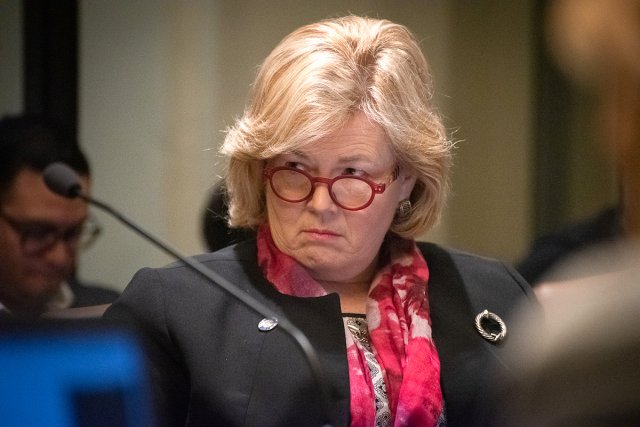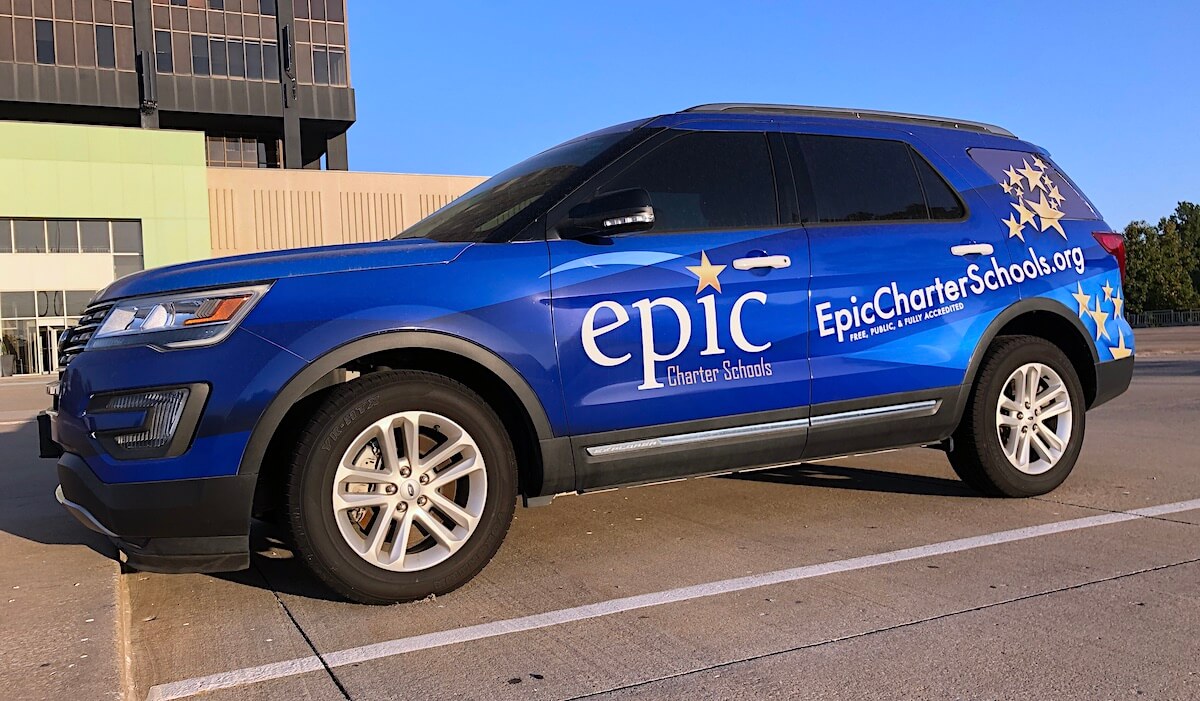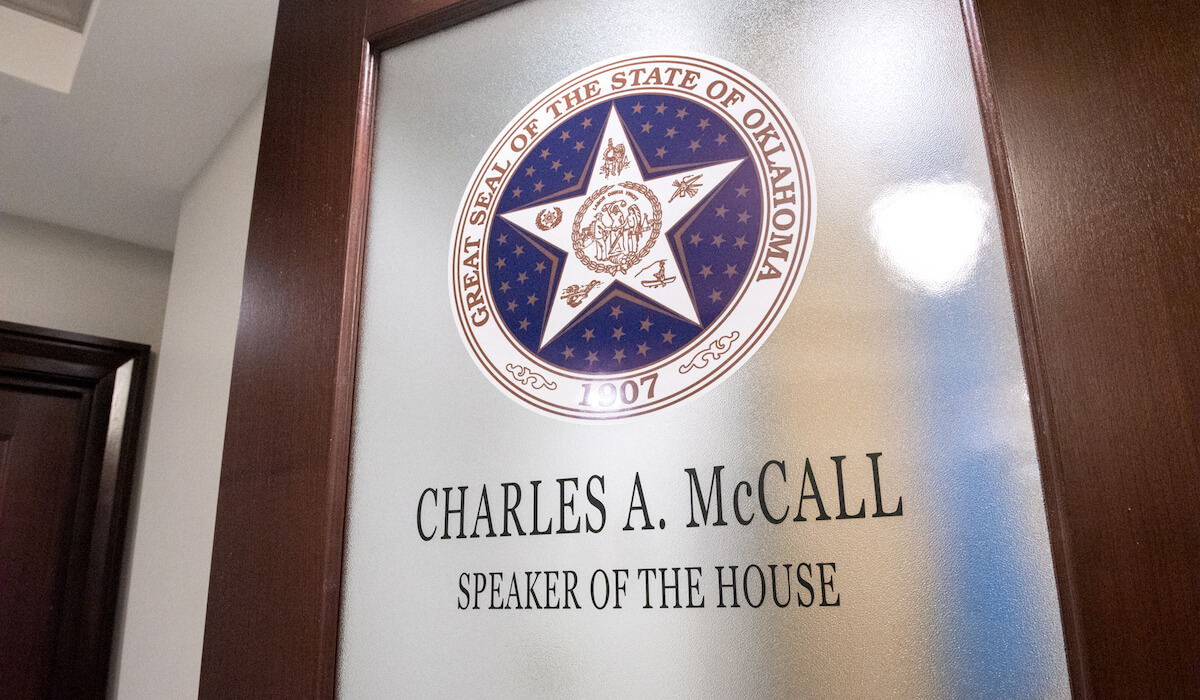
Following last week’s release of a 25-page multi-county grand jury interim report regarding an ongoing investigation into Epic Charter Schools, members of the Oklahoma House of Representatives are working to finalize language for a charter school reform bill similar to HB 1735, introduced by Rep. Sheila Dills earlier this year.
At this point, the bill (summarized below) would need to be authored by House Speaker Charles McCall (R-Atoka) and Senate President Pro Tempore Greg Treat (R-OKC), could be heard as early as Monday if language can be agreed upon this week. Lawmakers must adjourn the year’s regular session by May 28.
“With this multi-county grand jury report that just came out, and the fact that it really did align with the auditor’s findings as well, I think they felt like it was a very appropriate time to begin this process,” said Dills (R-Tulsa). “I think we have received the information we need to close the loopholes with educational management organizations and some accountability issues with charter sponsors, and also board organization with charter schools.”
Dills and Rep. Mark McBride (R-Moore) met Tuesday morning with representatives of Oklahoma charter schools who are concerned the bill could impose too stringent of requirements on their schools and the selection process of for-profit educational management organizations, which are often hired to support operations.
“I would hope it would be dealt with with more of a scalpel than a bludgeon or hammer,” said Chris Brewster, the superintendent of Santa Fe South Charter Schools and the president of the Oklahoma Charter School Association. “People feel some urgency to respond (after the grand jury report), but we would certainly recommend that folks sort of contemplate the long-term effects on other charters before making too many sweeping changes.”
Brewster was not personally in Tuesday’s meeting with Dills and McBride, but he said he believes most of the governance and transparency issues with Epic have been addressed in the virtual charter school’s recent settlement agreement with the Statewide Virtual Charter School Board.
“If there is still something we would need to address legislatively, I think that would be a good place for the bill to be considered next session, after the dust has settled,” Brewster said.
McBride, however, said Monday that Oklahoma’s public education system needs to prioritize student needs over profits for private companies.
“I have never, ever liked for-profit educational management organizations,” McBride said. “I’m more concerned with what it looks like for these families that are going to school at Epic and what happens to Epic with the findings.”
A long time coming

Dills first filed legislation to address charter school oversight in 2019, and Epic Charter Schools have been under investigation for alleged mismanagement of public dollars for nearly a decade.
Primary concerns about Epic raised by State Auditor & Inspector Cindy Byrd and the multi-county grand jury report involve Epic Youth Services, the for-profit educational management organization owned by Epic co-founders Ben Harris and David Chaney. Epic Youth Services has declined to make public records of how it used tens of millions of dollars in state funding for Epic’s controversial “learning fund,” which reimburses students for education expenses.
“The House is currently working on language to address this,” McBride said. “We have had something in the pipeline all along. We were just waiting for some kind of a signal or ruling — something to substantiate (allegations) — and some guidance. It is a total priority to do some kind of reform.”
Charter school proponents, however, worry that Dills’ bill will target all charter schools too broadly with proposals like compulsory training for board members and a competitive bidding process for selecting educational management organizations. (Brewster said Santa Fe South does not use such organizations.)
“Charter schools tend to be extremely fiscally responsible because we have [fewer] funds to work with,” Brewster said. “So I’m not sure that compelling a certain structural change in a bidding process is going to gain the taxpayer very much in this case.”
Dills said her goals are simple, and she is working to clean up HB 1735’s original “framework” by meeting with stakeholders, which she said Tuesday is going well.
Ultimately, she is focused on increasing transparency and oversight among charter schools, several of which have imploded in recent years.
“I think the intention of charter schools all along was to allow them to be innovative with their programs and that sort of thing, and we still want them to do that,” Dills said Monday. “But there has to be a certain level of transparency and accountability with all schools — not just virtual (charter schools). It has to be across the board.”
In Oklahoma, charter schools are public schools that can be authorized by traditional public school districts, colleges, tribal nations and the State Department of Education. A charter school’s authorizing entity is allowed to retain up to 3 percent of state funding as an administrative fee.
“If we have transparency and accountability issues with any school, we need to address that issue,” Dills said. “Most schools that are on the up-and-up with things are like, ‘Sure, that’s great. We do that anyway.’ Usually when there are red flags is when someone is saying, ‘Oh no, we don’t want any more transparency,’ or, ‘We don’t want any more accountability.'”
While Oklahoma charters such as Seeworth Academy, Harper Academy, Marcus Garvey Leadership School, Alexis Rainbow, Lighthouse and Langston Hughes Academy have closed over the past decade, Dills said the Epic Charter Schools controversy has presented the most evidence that state charter school laws need to be improved. With Epic’s attorneys arguing in court that financial records of Epic Youth Services are private, Dills said the law needs to be amended to specify that public funds held by a private educational management organization can be reviewed by the auditor, Legislature and others.
“In this particular situation, what was difficult was it was hard to hold this particular charter school accountable to providing information because they continually denied providing information,” Dills said. “So those entities weren’t able to make good, sound decisions based on that information, because they weren’t able to receive that information.”
Asked Monday about Dills’ efforts to finalize her charter school reform bill before the end of session, House Speaker Charles McCall said he and the rest of the House Republican Caucus “are talking about it and having those discussions.”
“I think there should always be transparency and accountability when it comes to public funds,” McCall said. “This is not a foreign concept. There has been legislation out there.”
McCall said many House Republicans have “wanted to see some type of indication” from the criminal investigation and from the State Auditor & Inspector’s Office’s lawsuit against Epic Youth Services before moving forward with legislation.
“You’re trying to find out what are perceived problems and what are real problems,” McCall said. “We’ve got some guidance and we’ve got some additional information that has come out regarding this issue, and that would apply to education as a whole and not, per say, one specific group. The House is always going to consider policy that makes things transparent and accountable, and it should be applied to everybody.”

‘We’ve got to make sure we do it right’
For the House to take up Dills’ proposal, however, Senate leadership would also need to be on board. Treat, who heads the Senate, leans heavily on his committee chairpersons when considering policy matters. In this instance, that would be Senate Education Committee Chairman Adam Pugh (R-Edmond).
“I think any time an entity is getting state dollars, we need to make sure they are spending it properly. But I think that would be the ask of anybody who is getting state money. And I think that’s a fair and reasonable ask,” Pugh said. “The other thing is, (…) when an entity is getting state dollars, we have to make sure they are structured properly, to dispense those so that our citizens are getting the service that we as taxpayers are paying for. I don’t think anybody would be on the other side of that issue.”
But Pugh said he thinks lawmakers need to approach the charter school reform effort carefully and deliberately.
“I am never in a hurry to pass a piece of legislation just because. We have to make sure we get it right,” Pugh said. “Despite pressure on either side, we’ve got to make sure we do it right. That, to me, is more important than making hasty policy decisions.”
Pugh said “a lot has changed” since Oklahoma’s charter school framework was created a decade ago and that the unusual multi-county grand jury report on Epic “requires our attention.”
“The biggest takeaway is that there were a lot of entities there that could have stepped in and had oversight, but they didn’t,” Pugh said, referring to the State Department of Education, as well as the Statewide Virtual Charter School Board and Rose State College, which authorize Epic One-on-One and Epic Blended, respectively.
On that point, Brewster agrees.
“The most important work in this type of bill is to develop a quality authorizer-charter relationship,” Brewster said.
He acknowledged that several charter schools have closed in Oklahoma over the last decade and another new one is struggling.
“That’s probably the most valid part of this entire discussion, honestly,” Brewster said. “An authorizer (or sponsor), for the administrative fee that they receive — and philosophically because they’ve signed on the dotted line with a developer to build that school — has significant responsibilities in seeing that that school is successful. Not just compliant, but seeing that it is successful.”
Brewster said addressing “a bad actor” would be different, but most charter schools simply need more support and guidance.
“Any time that we see a charter school struggling, almost always it’s an issue that occurred where people with good intent messed up something,” he said. “The charter authorizer should have been there at the very front of it assisting that charter school. So I think that where a change really does need to occur is with developing robust authorizer relationships with charter schools that are in existence.”
Brewster said his charter schools, which are changing their authorization from Oklahoma City Public Schools to Oklahoma City Community College this summer, “have had virtually no real interaction with our authorizer over time.”
Dills said she hopes her proposal will strengthen relationships and charter schools. But first, she said, the Legislature needs to clarify that the issues with Epic Youth Services should be prevented from happening again.
“This was never, in my opinion, the Legislature’s intent for an educational management organization to take millions of dollars that were appropriated for students, put it into a private bank account and then say there is no transparency or accountability there,” Dills said.
Pugh said he takes issue with a private educational management organization acting as a “quasi-public entity” in the education of public school students.
“We’ve learned a lot about charter schools since this original structure was founded more than a decade ago. So things have changed,” he said. “Obviously the numbers have grown as well, so the dollars have gotten significantly larger. So I think all that stuff has to be on the table.”
Dills agrees.
“It’s really about transparency and about accountability. It has nothing to do with school choice,” Dills said. “We want kids and their parents to have choices about how they are educated. This is about being good stewards of taxpayer dollars, making sure that the funds are accounted for and making sure that kids are getting the money they are designated for their learning.”
Follow @NonDocMedia on:
HB 1735 original language
While Dills is leading negotiations this week over what her charter school reform bill needs to look like, those interested in the issue can review her original “framework” in HB 1735.
As originally filed at the beginning of session, the bill would:
- Add new requirements for a charter school’s sponsor and require the sponsor to annually evaluate its charters according to a charter school performance framework developed by the State Department of Education.
- Require those evaluation results to be posted on the charter school’s website and be presented to the boards of the charter school and the sponsoring organization during open meetings. The bill would also make a charter school “subject to the limitations on spending for any funds received from the state, either through the State Department of Education or other sources, including provisions of the Oklahoma Constitution.” It would also specify that a charter school shall not “provide or otherwise supplement instruction of home-schooled students or students enrolled in private schools,” which is an allegation lodged against Epic. The bill would also specify that “all assets of a charter school” are considered public property of the charter school, and it would require charter schools to submit to “an accountability audit” to be prescribed and executed by the State Auditor & Inspector’s Office.
- Require a charter school’s sponsor to “pay any financial obligation remaining at the time of termination of the charter school contract.” Under the bill, any charter school governing board or charter school sponsor governing board that considers entering into or renewing an agreement with an educational management organization would be subject to competitive bidding requirements. At least once every three years, any educational management organization agreement would be renegotiated and subject to competitive bidding requirements.
- Cap the percentage of state revenue retainable by a sponsoring school district, organization or the Statewide Virtual Charter School Board at 3 percent of the revenue or $500,000, whichever is less.
- Beginning with the 2021-2022 school year, require any governing board of a charter school that contracts with an educational management organization to have oversight of only one school district, meet at least once each month, not delegate duties or oversight responsibilities to an educational management organization, adopt a charter to ensure compliance with all relevant guidelines and appoint a board clerk, minute clerk and encumbrance clerk. Members of a charter school’s governing board would be required to take continuing education courses provided by the State Auditor & Inspector’s Office, submit financial disclosure forms to the Oklahoma Ethics Commission, and receive no pecuniary gain from the earnings of an educational management organization. The bill would require at least two members of a charter school governing board that contracts with an educational management organization to submit applications to and be appointed by the school’s sponsoring organization.
- Specify that state funds appropriated to any charter school that contracts with an educational management organization shall remain public funds, shall be subject to audit and transparency reporting requirements, and shall not be transferred or converted in any way to private funds, except for funds paid as an administrative fee to such an organization. Every entity that contracts with a charter school that hires an educational management organization shall file a current state and national criminal history record check with the State Department of Education for every owner and employee who will have contact with students. The bill prohibits educational management organizations from managing or controlling a charter school’s governing board, from employing a superintendent of the charter school who is also an owner of the company, from employing legal counsel who also represents the charter school or charter school governing board, and from requesting teachers or other charter schools to complete tasks or perform duties on behalf of the private business.





















